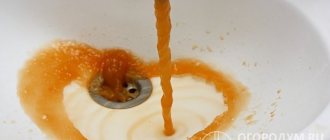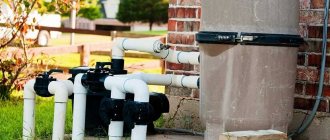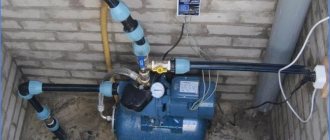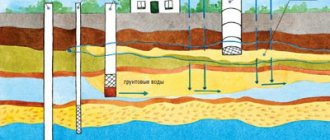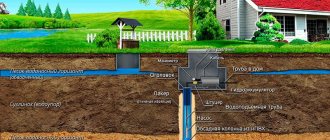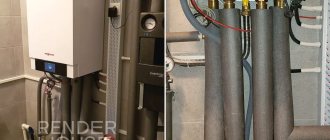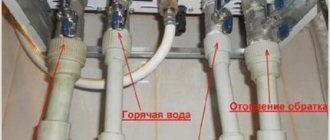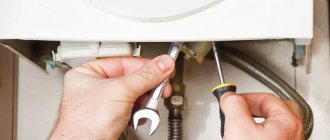The mineral salts contained in water, especially calcium compounds, make it hard, tasteless and dangerous both for human health and for the normal operation of plumbing and electrical appliances. A lime filter for home water can help get rid of them. Drinking water softener filters differ in efficiency, operating principle, installation method, dimensions and other characteristics. To choose the best option, you need to study all existing ones.
Some filter units require a lot of space and a separate room Source vodopodgotovka-vodi.ru
How to find out water hardness
Before deciding whether you need a lime water filter, you need to determine its composition. In addition to hardness salts, there may be other organic and inorganic impurities in water, which it is advisable to get rid of. The quality and content of mineral salts also varies, which can affect the choice of filter.
According to GOST 31865-2012, the hardness level of drinking water should be no more than 7 mEq/l. But even at 5 mEq/L, calcium and magnesium salts significantly spoil its quality, depositing in the form of scale on the walls of dishes and heating elements, creating a deposit on dishes and washed clothes. There is no need to talk about the dangers of such water for health.
You can check the quality of water in different ways, the most reliable of which is to analyze samples in the laboratory. If you only need to find out the hardness, you can use household salt analyzers or test strips, which can be found in household appliance stores.
Household water quality analyzer Source cdek.market
Based on the data obtained, you can decide how to purify water from lime and which filter to use for this.
Cleaning with a plunger
To remove blockages in the drainage system, you can use a plunger.
The sink is filled with water, the drain hole is covered with a plunger and the rubber part is pressed tightly. Water should cover the plunger head. The overflow hole must be plugged; if the hole is open, it will not be possible to increase the pressure.
To break through the blockage, use a plunger to make pushing movements, pressing and releasing it. When releasing the plunger, you should not tear it off the surface of the bathtub or sink; do this several times and sharply tear off the plunger; the water should go away immediately. If this does not happen, repeat the procedure again.
When the plunger is pressed, pressure is generated in the sewer pipe, which destroys the lump of debris and pushes it further down the pipe; when the plunger is released, a vacuum is created over the blockage, which pulls the blockage to the drain hole and it can be removed.
Simple ways to soften drinking water
A small volume of water used only for drinking and cooking can be purified using simple folk methods:
- by settling for several hours and draining clean water from the sediment;
- boiling;
- freezing, in which all impurities accumulate in the central part and are removed.
But these methods are inconvenient and time-consuming. In everyday life, a portable jug filter is more often used to purify water from lime for the home.
Jug filter Barrier Source main-cdn.goods.ru
It contains a cartridge with activated carbon or other filler that retains particles of mineral salts. Over time, it becomes clogged, so the cartridge or its contents need to be periodically replaced.
See also: Catalog of companies that specialize in engineering systems (heating, water supply, sewerage and others) and related work
Preventive measures
Without regular maintenance, the pipeline wears out quickly. Lime deposits not only reduce water pressure, but also negatively affect the metal. Under a layer of plaque, it rusts faster and leaks appear. Preventive measures include installing a coarse filter. It is placed at the entrance, before the counter.
The part is a cylinder made of fine mesh. Filter material is stainless steel. The mesh traps large debris and rust particles. It screws into the cork flange. If the water quality is low, the cylinder quickly clogs. Regular cleaning of the filter is required, otherwise the pressure will decrease. To prevent the formation of limescale, it is recommended to use softener filters.
Types of household filters for hard water
The methods described above are only suitable for summer residents and residents of city apartments with normal quality tap water. Owners of country cottages with an autonomous water supply from a well or borehole require water to be fully purified from lime in order to protect equipment from breakdowns, dishes from scale, laundry from gray deposits, etc. In a word, it is necessary to rid it of unnecessary impurities before it enters the internal plumbing system.
This can be done using filters of different designs.
Ion exchange
This filter consists of two rather impressively sized blocks.
Diagram of an ion exchange treatment plant Source prom.st
Water enters the main container (2), filled with ion exchange resin. As the filter passes from top to bottom, magnesium and calcium ions are replaced by safe sodium ions, after which the softened water rises through a pipe located in the center and enters the distribution network.
In front of the ion exchange tank, a coarse filter (1) is often cut into the supply line to retain sand. And at the outlet they install a fine carbon filter (5).
Such a filter for lime water reduces its hardness to 0.01 mEq/l, but as the filler becomes contaminated, it loses its ability to ion exchange and requires regeneration. To do this, a tank with reagents (4) is installed nearby to backwash the resin, wash out calcium salts from it and “charge” it with sodium ions. It is connected to the drainage pipe.
The reagent for resin restoration is tableted table salt Source chelyabinsk.gydrost.ru
Washing is carried out once every 2-4 weeks, depending on the volume and quality of filtered water, and takes from half an hour to two hours. This can be done manually or the process can be automated. For an uninterrupted supply of purified water, 2 sections are installed, alternately switched off for regeneration.
Cleaning with hydrochloric and citric acid
High-quality chemical cleaning of water and other pipes requires the presence of strong chemical reagents or products with components that must be properly diluted with water and poured into the pipe. Such mixtures can destroy any scale.
Hydrochloric acid is a very strong reagent. It is necessary to clean steel or cast iron risers with its help very carefully, since such a chemical descaling agent can greatly harm old pipeline structures. There have been cases where, as a result of a chemical reaction, through holes were formed in the iron.
When using hydrochloric acid to descale pipes, one should not forget to comply with safety regulations. Before starting work, you need to make sure that the room is well ventilated. After all, not only acid fumes are dangerous, but also gases that will be released during operation. Also, it is necessary to protect your eyes, hands, and respiratory organs from the possible influence of the chemical substance.
Work should begin with a solution of 5-10% concentration. If you do not achieve the desired result, you should increase the amount of acid.
Important! It is not recommended to use a hydrochloric acid solution with a concentration greater than 33-35%, otherwise the pipes may be damaged.
The end of the washing process, which can last 3-4 hours, is indicated by the absence of foam. The used solution should be poured into an unnecessary container, neutralized with lime and poured in small portions in a remote, remote corner where no one walks.
Important! After chemical cleaning of pipes, you need to rinse them with plenty of water until you are sure that the chemicals are completely washed away.
In terms of its popularity and effectiveness, citric acid is almost in no way inferior to hydrochloric acid. It is used to clean pipes from scale both in industry and at home.
But such a reagent should be used with some restrictions:
- it is necessary to take into account that the solution should be prepared in the following ratio: one percent per millimeter of limestone plaque;
- When working with a descaling agent such as citric acid, you should not use enamel and aluminum cookware, as you can be poisoned by harmful substances that will be formed after a possible chemical reaction.
Important! The concentration of citric acid solution should be in the range from 3 to 10%. A composition with a higher reagent capacity can burn through not only the formed scale, but also the surface of the pipe.
Plus, cleaning pipes from scale with citric acid does not involve the use of solutions less than 3% concentration, since such a mixture can only partially dissolve the scale.
Video description
This video shows the device of a flow-through kitchen filter:
On a note! Flow filters can be supplemented with reverse osmosis units with a membrane to purify water from viruses, bacteria and the smallest impurities.
Polyphosphate
To prevent lime in well water from settling in electrical appliances, it can not be removed, but rather neutralized by passing it through a polyphosphate filter. This is a flask filled with crystalline polyphosphate salt, when hard water passes through it, the salts contained in it are enveloped in a film that prevents the formation of scale.
This filter purifies water very moderately and saturates it with polyphosphates, so it cannot be used for preparing drinking water. It is highly specialized and is used to prevent lime deposits in washing machines, boilers, heating boilers and other equipment.
The cover has a threaded hole for connecting to the outlet coming from the main network to the equipment Source pixy.org
The contents of the flask are periodically replaced, since the polyphosphate salt gradually loses its properties during operation.
Magnetic
Lime in water is represented by salts that have a certain structure. By influencing them with a magnetic field, it is possible to change this structure and physical properties of the compounds. When heated, ordinary hardness salts turn into calcite and form hard scale on the walls of pipes and appliances. And after modification, they settle to the bottom in the form of loose, easily removed sediment.
Magnetic converters, which can be overhead or embedded in the main pipe, cannot be called filters in the literal sense of the word, since they do not filter water, but transform its physical properties without changing its composition.
Flow and overhead magnetic filters Source bazaltm.ru
Since hardness salts remain in the water, it remains unsuitable for cooking and drinking. Its treatment with a constant magnetic field only guarantees the cleanliness of heating elements and parts of electrical appliances.
Signs of deposits
Rusty water and low pressure are the first signs of a problem.
Rust deposits change the color and taste of the water. The liquid becomes reddish, and an iron taste appears. Sediments with a mineral or biological structure also cause turbidity in the stream. The main sign of plaque formation is a decrease in water pressure. Apartment residents should ask their neighbors about the status of their water supply. If the rest of the system is working properly, there is a blockage in the line section.
Disadvantages of overgrown water pipes:
- pressure and estimated water consumption are reduced;
- a suspension of small particles appears in the water;
- the surface of the highway is destroyed;
- Chlorine quickly disappears, the degree of disinfection decreases;
- the operation of the shut-off valves is disrupted.
If there is significant sediment formation in the old main, it is best to replace the pipes. After long use, their surface is severely damaged by corrosion, deposits will appear very quickly. In new water supply systems, it is enough to clean the cold water pipe in the apartment without replacing it.
Features of filter selection
The main criterion for choosing a water filter is its composition. You may need not only a softener, but a comprehensive cleaning system.
If the water does not contain bacterial contaminants, iron salts and heavy metals, you need to solve such a narrow problem as purifying lime from well water based on your own needs and conditions.
- Having a suitable isolated room in the house, you can install ion exchange equipment in it, which will efficiently purify all water coming from the well.
- If you use only bottled or spring water for cooking and drinking, it will be enough to install salt or magnetic filters on each electrical appliance that consumes water or on a common water supply.
- A flow-through kitchen filter will help you obtain drinking water, and in combination with magnetic converters and polyphosphate filters it will solve the problem of lack of space for installing large universal equipment.
For high-quality comprehensive water purification, several filters may be required Source oboiman.ru
Concrete milling
This type of mechanical processing is used to prepare concrete bases for floors, for end-block coverings, concrete, stone, ceramic, metal and other slabs, self-leveling coatings, and rolled materials.
Using milling, you can create the necessary evenness of a concrete floor without resorting to the installation of an additional leveling screed
In addition, milling can be used to reduce the time required for grinding mosaic and concrete floors , reducing the labor intensity of their installation, as well as for installing concrete coatings with a special relief during the construction of roads, bridges, airfields, spillways, etc.
The relief of the concrete surface, created using milling, improves the grip of vehicle wheels, increases the durability of concrete structures in conditions of cavitation destruction when fluid moves at high speed (dam spillways).
Milling of concrete is carried out for the purpose of:
- rough elimination of large irregularities and sagging on concrete surfaces, the height of which ranges from 5 mm to 2 cm;
- removing the top layer of concrete 3-10 mm thick for various reasons;
- lowering the elevation of a section of concrete floor, creating a slope;
- removal of old concrete, heavily contaminated with fuels and lubricants;
- removal of low-quality cement-sand screeds;
- removal of old or deteriorated polymer coatings;
- removing the hardened top layer (topping) before installing the polymer coating.
Briefly about the main thing
Even your own well does not guarantee that the water entering the house will be clean. It may contain a variety of impurities, and most often its composition is spoiled by hardness salts, which must be gotten rid of. Purifying water from lime from a well using household methods is not very effective and does not solve the problem of protecting household appliances and heating equipment from scale. This can only be done with the help of ion exchange, mechanical, salt, and magnetic filters. Each of them has its own characteristics and is selected individually.
Cleaning away limestone deposits
To ensure that risers do not deteriorate from the inside, are used for a long time, do not reduce thermal conductivity, and also have an attractive appearance, it is necessary to regularly clean them of limestone deposits.
Mechanical and chemical cleaning are considered not very effective, since during their implementation the surface metal layer is destroyed. Plus, during such cleanings it is sometimes necessary to dismantle the system, which is not always pleasant, and from a financial point of view it is not very profitable. In addition, if you use chemical cleaning, you should strictly follow the instructions. Otherwise, you can not only harm yourself, but also harm the environment. Although, many people prefer these methods of protection against scale.
To carry out automated cleaning of pipes from rust and limestone deposits, use:
Compressor for purging
- compressor;
- automatic pump;
- high pressure devices.
With the help of a water or air jet supplied by these mechanisms under high pressure, limestone deposits are torn off the internal surfaces of the pipes and come out.
Using even the best methods and methods for removing scale in pipes, some of the metal is removed along with pieces of plaque. Therefore, it is better to prevent clogging of structures, for which it is necessary to regularly carry out preventive measures in order to eliminate the possibility of scale formation.
Important! The cost of preventative work to prevent the formation of limestone deposits is much cheaper than the process of cleaning a contaminated pipeline system.
Price
The cost of work depends, first of all, on the initial state of the concrete surface and its strength, as well as on the scope of work, the type of equipment and consumables used.
Cost of services for mechanical processing of concrete surfaces:
| Name of works | Cost, rub/m2 |
| Milling up to 3 cm deep | 620 |
| Pre-grinding | 180 |
| Final sanding | 140 |
| Removing decorative coating by sanding | 260 |
| Sandblasting concrete surfaces | 220 |
| Cleaning facades after a fire | 150 |
Pipe cleaning with pneumatic-hydraulic pulse
And finally, the newest technical method is cleaning using a pneumatic-hydropulse installation. This device creates a shock wave inside, which causes the formation of bursting bubbles and bubbling of water, which affects contaminants, tearing them off the walls and thus cleaning them. These installations are most often used for general sewers, large-scale cleaning, and in places where wastewater accumulates. After cleaning with special suction pumps, the contaminants are sucked into tanks, the capacity of which can reach 14,000 liters.
Cleaning of pipes for preventive purposes should be carried out at least once a year, then emergency situations can be avoided, which will greatly facilitate a comfortable life.
Reasons for dismantling work and conditions for its implementation
Concrete structures are most often demolished when they have served their purpose or have begun to collapse due to man-made disasters or natural disasters. But there are other reasons why sometimes quite strong structures have to be destroyed.
- Clearing the area for new construction.
- Demolition of structures erected without a design or in violation of technology, and posing a danger.
- Work on redevelopment, reconstruction of buildings and communications.
- Dismantling old objects that do not fit into the landscape.
Since it is not always possible to gouge concrete without prolonged noise, strong vibration, dust and debris, dismantling work can cause serious inconvenience to people - residents of the house, neighbors. And when large objects are demolished, nature and nearby buildings suffer.
Demolition of a wall during redevelopment of a house Source bosch-professional.com
To minimize these negative consequences and avoid conflicts, in each specific case you need to try to choose the optimal methods of destruction. They are mechanical, thermal, chemical. We will not consider explosives, since their use by private individuals is illegal.
